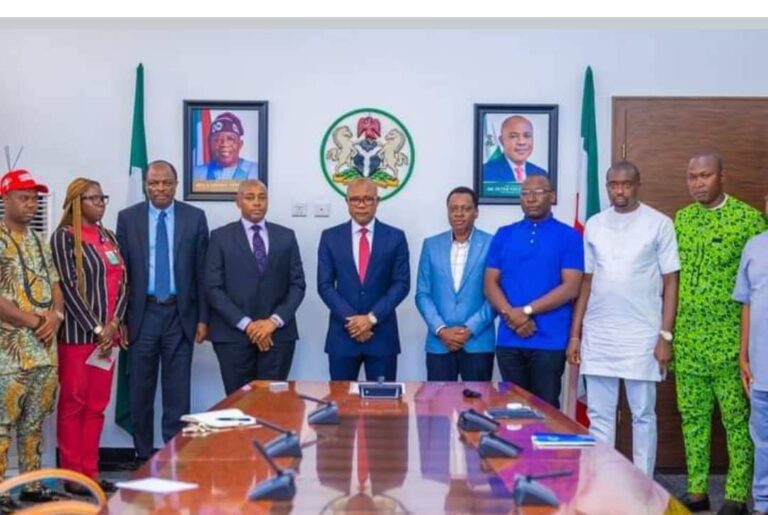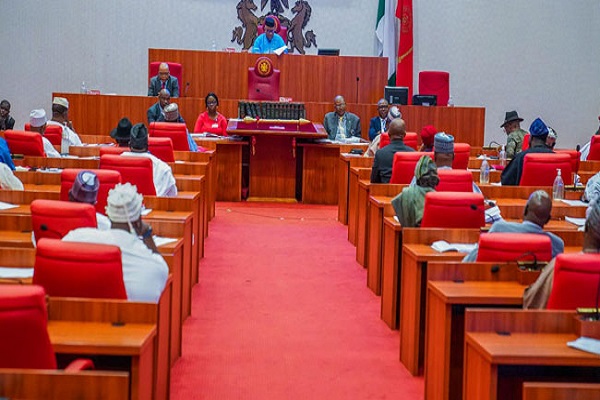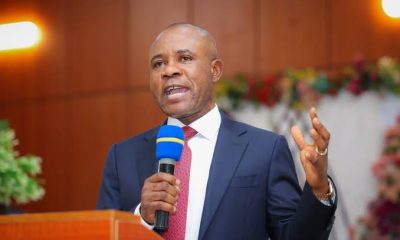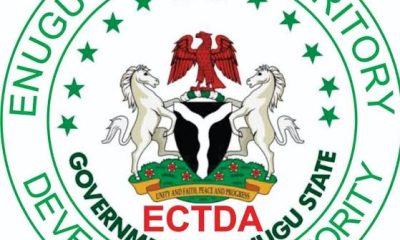News
Fuel subsidy removal: Gov. Mbah inaugurates committee on palliatives

Gov. Peter Mbah of Enugu State has rolled out palliatives to mitigate the harsh economic effects of the recent removal of fuel subsidy by the Federal Government on residents of the state.
He stressed that his government felt the pains the people were passing through.
The governor disclosed this on Monday in Enugu while inaugurating a committee for the procurement, storage and distribution of the relief items to the public.
He charged members of the committee, chaired by the Deputy Governor, Mr Ifeanyi Ossai, to handle the palliatives with transparency, while ensuring the speedy distribution of the items to those in dire need of them.
Also, members of the committee include the chairman, Association of Local Governments in Nigeria (ALGON), Enugu State, and Chairman of Nkanu East Council Area, Mr Okechukwu Edeh.
ALGON Deputy Chairman and Chairman of Uzo Uwani Council Area, Mr Chukwudi Nnadozie, Chairman of Awgu Council Area, Mr Pedro Nwankwo and his Enugu East counterpart, Mr Livinus Anike are also members.
Others are the Special Adviser to the Governor on Agriculture, Mike Ogbuekwe, Programme Manager of Enugu State Agricultural Development Programme (ENADEP), Dr Ogbonna Onyeisi, and the head of the State Emergency Management Agency (SEMA), Chinasa Mbah.
Mbah who acknowledged the harsh impact of the fuel subsidy on the people, further said that the subsidy removal, would, however, immensely benefit Nigerians in the long run.
While maintaining that he shared in the pains Nigerians were going through at the moment, Mbah expressed the hope that the palliatives would help alleviate their hardships.
He also enjoined the committee to spare no time in ensuring that the palliatives were sent to “homes of those that need them the most in the state”.
He said, “You recall that few months ago the Federal Government of Nigeria removed the fuel subsidy. And as you know, that came with pains, shared pains, even though we believe in the long run, it will be beneficial to the country.
“The question for us now as leaders is, how do we mitigate those shared pains that our people are going to be exposed to? It is part of what we are doing to see how we can begin to cushion the effects of some these pains.
“So, what we are doing now is to see how to fix the pains people are going through and there are also plans for short and medium term solutions, and that we are going to do in due course.”
The governor further charged the committee to ensure that the palliatives got to the people who deserved it and also ensure it was distributed with speed and transparency.
Responding on behalf of the committee members, Ossai expressed the committee’s readiness to deliver on the assignment and work with the template given to them in ways that would reflect transparency.
He appreciated the governor for meeting the yearnings of the people, even as he assured that the committee would not disappoint in the discharge of their responsibilities.
Headline
Prince Harry visits sick Nigerian soldiers in Kaduna

Prince Harry and his team visited the 44 Nigerian Army Reference Hospital in Kaduna to interact with wounded soldiers who are receiving treatment.
The Duke of Sussex is in Nigeria with his wife to champion the Invictus Games, which Harry founded to aid the rehabilitation of wounded and sick servicemembers and veterans.
Nigeria joined the Invictus Community of Nations in 2022 becoming the first African country to join.
Prince Harry’s visit to Kaduna came 68 years after his late grandmother Queen Elizabeth II visited the state during the time of the late Premier of Northern Region Sir Ahmadu Bello.




News
Senate approves death penalty for drug traffickers

Senate on Thursday, May 9, approved the death penalty for those convicted on the charge of drug trafficking in the country.
The punishment prescribed in the extant NDLEA Act is a maximum sentence of life imprisonment.
The resolution of the Senate followed its consideration of a report of the Committees on Judiciary, Human Rights and Legal Matters and Drugs and Narcotics, National Drug Law Enforcement Agency (NDLEA) Act (Amendment) Bill, 2024.
The Chairman of the Committee on Judiciary, Human Rights & Legal Matters presented the report during plenary, Senator Mohammed Monguno (APC-Borno North).
The bill, which passed its third reading, aims to update the list of dangerous drugs, strengthen the operations of the NDLEA, review penalties, and empower the establishment of laboratories.
Section 11 of the current act prescribes that “any person who, without lawful authority; imports, manufactures, produces, processes, plants or grows the drugs popularly known as cocaine, LSD, heroin or any other similar drugs shall be guilty of an offence and liable on conviction to be sentenced to imprisonment for life” was amended to reflect a stiffer penalty of death.
Although the report did not recommend a death penalty for the offence, during consideration, Senator Ali Ndume moved that the life sentence should be upgraded to the death penalty.
During a clause-by-clause consideration of the Bill, Deputy Senate President Barau Jibrin, who presided over the session, put the amendment on the death penalty to a voice vote and ruled that the “ayes” had it.
But Senator Adams Oshiomhole objected to the ruling, saying that the “nays” had it.
He argued that matters of life and death should not be treated hurriedly, but Barau said it was too late, as he failed to call for division immediately after his ruling.
The bill was subsequently read for the third time and passed by the Senate.
-

 Headline5 days ago
Headline5 days agoSuspend cybersecurity levy– Reps to CBN
-

 Business5 days ago
Business5 days agoNigeria needs over $2bn to revive Ajaokuta Steel Plant, says Minister
-

 Headline3 days ago
Headline3 days agoPrince Harry visits sick Nigerian soldiers in Kaduna
-

 Entertainment3 days ago
Entertainment3 days agoAMVCA Cultural Day: BBNaija’s Neo, Venita win Best Dressed Male, Female
-

 Metro3 days ago
Metro3 days agoEx-Sports Minister laments after hospital neglected him for hours over N80000 deposit
-

 Headline5 days ago
Headline5 days agoTinubu resumes work after foreign trip
-

 News5 days ago
News5 days agoShan George’s money returned to Zenith Bank account









